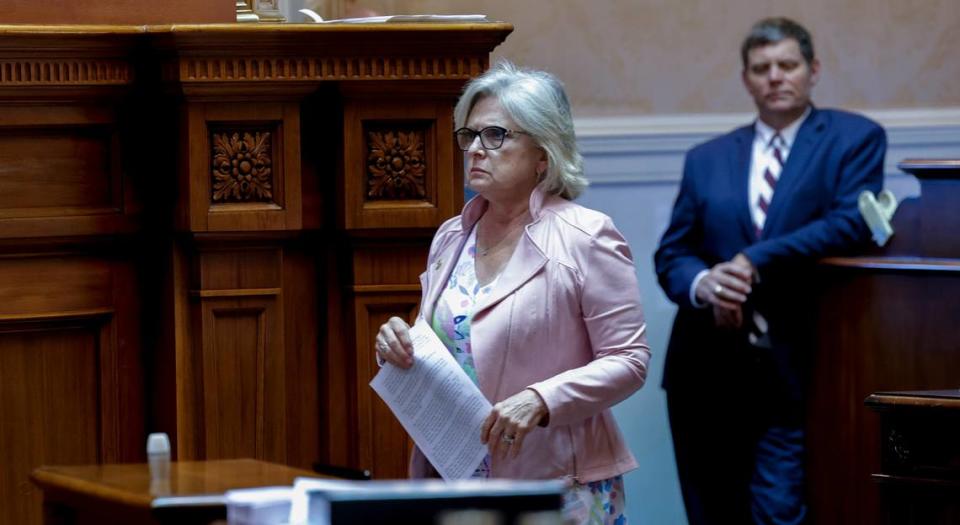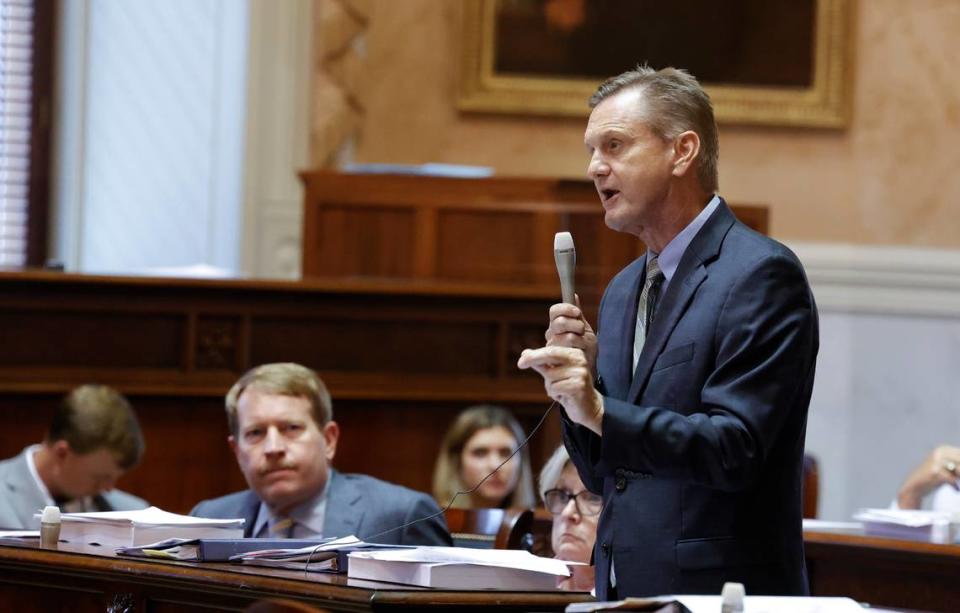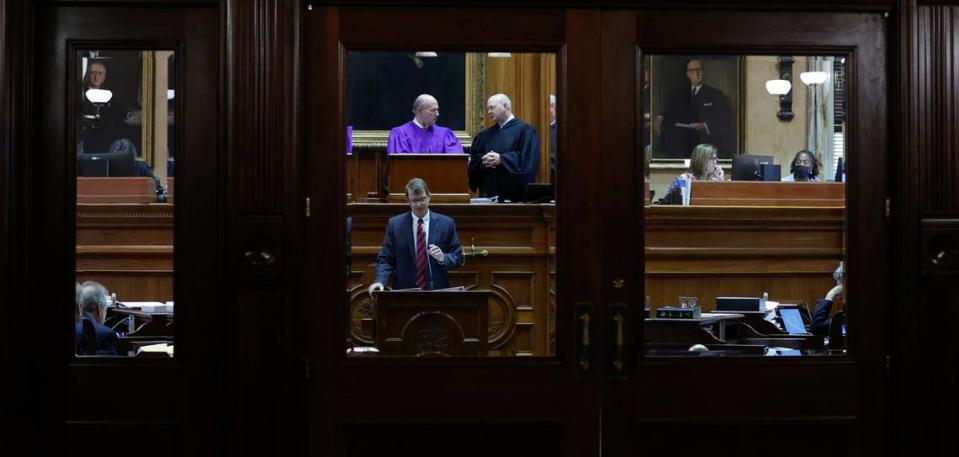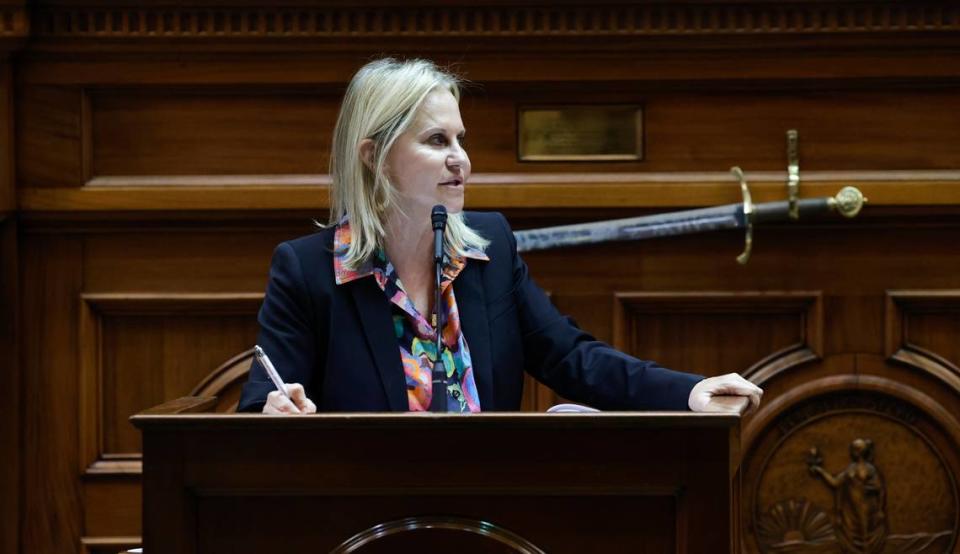SC Senate rejects near-total abortion ban — again. What will lawmakers do now?
- Oops!Something went wrong.Please try again later.
A proposal that would ban nearly all abortions in South Carolina has failed in the state Senate for the second time in less than a year.
The finale Thursday after a three-day debate and filibuster came as no surprise after the chamber’s Republican leader repeatedly expressed that the Senate lacked the votes necessary to move the House-backed legislation, H. 3774, forward. Six Republican senators joined Democrats to vote 22-21 Thursday to “continue” the bill, meaning senators can’t debate the restrictive ban for the rest of the session, which ends May 11.
Instead, Senate Majority Leader Shane Massey urged the House to pass the Senate’s so-called “fetal heartbeat” six-week bill that would ban abortions once fetal cardiac activity is detected, which critics argue is before many people realize they are pregnant.
Earlier this year, the South Carolina Supreme Court ruled the state’s previously passed six-week ban unconstitutional, saying it violated the state’s constitutional right to privacy. But with a newly all-male Supreme Court after the retirement of the bench’s only female justice, Kaye Hearn, some legislators have hoped to pass a new abortion law for the court to consider.
“I’m disappointed, but I’m not surprised,” Massey, an Edgefield Republican, told reporters after the vote Thursday. “I think we all knew this is kind of where we were headed. But, look, we wanted to give it a best shot. We gave it our best shot, and my hope, now, is that the House will understand the vote and that they will take up the ‘heartbeat’ bill so that we can try and save as many lives as we possibly can.”

The vote marks the second time in less than a year Republican lawmakers have failed to reach a consensus over abortion limits.
“It has been said that doing the same thing while expecting different results is the definition of insanity,” said state Sen. Katrina Shealy, R-Lexington, one of five female senators. “And here we are again, doing the same thing.”
Both chambers’ proposed abortion bans included narrow exceptions for rape, incest, fatal fetal anomalies and the mother’s life. But Democrats and some Republicans criticized the House bill as a step too far, saying it left no room for the rights of the mother.
“I can’t support a bill that is predicated upon the assumption that the state has a compelling interest, a duty to protect a life as defined as when the sperm fertilizes the egg,” said state Sen. Tom Davis, R-Beaufort. “That makes me very uncomfortable to arm the government with that kind of power.”
A similar scenario occurred last fall, when state lawmakers met in a special session after the U.S. Supreme Courts’ Dobbs decision, overruling the 1973 landmark case Roe v. Wade.

Both chambers passed dueling abortion bans, ultimately unable to agree on how restrictive an abortion ban should be.
“To be blunt, the majority (in this Senate body) has no frame of reference, since only five of us in this body have actually given birth,” said Richland County Sen. Mia McLeod, an Independent. “Yet, they still try to speak with authority, since they can’t speak from experience.”
Without a consensus, and with the state Supreme Court’s block of the six-week ban, the state’s previous 20-week ban is in effect.
As other states, including Georgia and Florida, have passed laws banning abortions past six weeks, the number of abortions performed in South Carolina has steadily risen, driven in large part by out-of-state visitors, according to new data from the S.C. Department of Health and Environmental Control.
“It’s up to the House now, right?” Massey said. “They have the ability to prevent thousands of abortions in South Carolina.”
Both chambers, however, have a time problem.
Six days remain on the legislative calendar, and House GOP leaders, similar to the Senate, say they have other top priorities they want to finish before 5 o’ clock strikes on May 11.
“Time is not our friend right now,” House Majority Leader Davey Hiott, R-Pickens, told The State. “We’ve got other things we’ve got to get done. Time is not on our side right now. We’ll just have to talk about it. We’ll bring it to (the House Republican) caucus on Tuesday.”
Hiott said Thursday he plans to speak with House Speaker Murrell Smith, R-Sumter, and state Rep. John McCravy, R-Greenwood, who has remained adamant that he cannot support a six-week ban. McCravy could not be immediately reached for comment.
Hiott said a House vote on the Senate’s six-week bill, S. 474, would be close based on past experience.
“We’ve taken up abortion bans, every abortion bill that comes through here,” he said. “We’ll take a look at it. Maybe take it up. This is not part of our last two-week agenda. Obviously (it) will be now.”

The Legislature’s debate over a restrictive abortion ban comes amid a national debate about abortion restrictions, with the issue grabbing headlines in the 2024 Republican presidential race.
Republican presidential candidate and former South Carolina Gov. Nikki Haley recently announced support for national abortion restrictions, saying the federal government should have some role in regulating the procedure. She also called for consensus, acknowledging that a federal ban may not ever go as far as anti-abortion advocates want.
South Carolina Republican U.S. Sen. Tim Scott, who launched a 2024 exploratory committee, has waffled on the issue of national restrictions, first declining to say he’d back U.S. Sen. Lindsey Graham’s proposed 15-week federal ban, then saying he supports federal restrictions and would sign a 20-week ban if elected president.
If a near-total ban is proposed in the State House again in 2024, Massey told reporters Thursday that he believes it would have the same result yet again: failure in the Senate.
“I’m shocked to this day that we could not pass the House bill last September,” said state Sen. Richard Cash, R-Anderson, arguably the Senate’s most vocal anti-abortion member.
“We talk about being pro-life. We talk about, in the Republican Party, how we value the life of that baby in the womb, but we get a little agitated when people want to talk about that too much,” Cash continued. “Would we be agitated if there was a school shooting and 46 people were killed today?”

As majority leader, Massey faced heavy criticism, particularly from Charleston Republican Sen. Sandy Senn, over the decision to have the debate at all, knowing where the votes stood. Senn likened some of her Republican colleagues to a herd of 1,500 sheep jumping off a cliff to their death.
Sheep “learn to follow the leader, and when the leader jumps, the rest follow,” Senn said. “Human beings should not be hardwired like that.”
Massey defended his decision to give the bill priority status, saying Thursday it was important to try and break the impasse.
“My response to Sen. Senn will be in 2024,” Massey said, declining to elaborate.
Editor Maayan Schechter contributed to this report.
